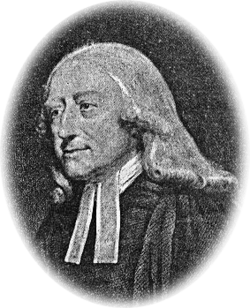| Part of a series on |
| Methodism |
|---|
 |
| |
The Sunday Service of the Methodists [nb 1] is the first Christian liturgical book given to the Methodist Churches by their founder, John Wesley. It has its basis in the 1662 Book of Common Prayer. [2] Editions were produced for Methodists in both the British Empire and in North America. [3] Wesley published the first edition in 1784 as The Sunday Service of the Methodists in North America with Other Occasional Services. [2]
Contents
The liturgical book reflects Wesley's theological preferences. For instance, the officiant is referred to as "minister", "elder" or "deacon", not "priest". Among the items of the Book of Common Prayer that Wesley "did not undertake to defend" were saints' days, priestly absolutions, the answers of the sponsors in baptism, private baptism, sung liturgical texts, the ring ceremony in the marriage rite (which Wesley considered pagan [3] ), and certain resurrection language in the burial rite. [1] [2] The Nicene Creed is also excluded from the communion rite, as the Apostles' Creed is already recited in Morning Prayer. [2] Some prayers use modernised language, such as changing the Lord's Prayer from "which art in heaven" to "who art in heaven". [2]
In England, Wesley's liturgical book was not replaced in the Wesleyan Methodist Church until 1882 and even then, though not widely used, continued in print for a while. [1] The Sunday Service has immensely influenced later Methodist liturgical texts. [4] The Order for Morning Prayer for the Methodist Episcopal Church, for example, was adapted from The Sunday Service. [4] Later, the 1965 Book of Worship for Church and Home reprinted the original Morning Prayer office used in The Sunday Service. [4] Many of the liturgical rites, such as that of the Lord's Supper, in "The Ritual" of The Discipline of The Allegheny Wesleyan Methodist Connection have preserved various prayers published in The Sunday Service. [5]